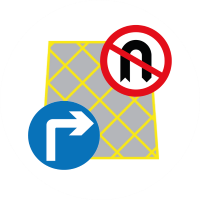Find Key Cases
Browse key cases using the filter for either ‘Contravention type’ OR ‘Issue’. Alternatively, use the ‘Search…’ box to find cases through a custom query.
Cases on the site currently cover parking, bus lane, moving traffic and road user charging, including the London Congestion Charge and Clean Air Zones (outside London). More cases and contravention types will be added in due course.






Please note: All adjudicator decisions included on this website are in the public domain. While they have been curated together here for the convenience and interest of users, any information contained within the decisions remains the responsibility of the original adjudicating body. Any questions relating to the content of cases should also be directed to the adjudicating body.
Mr R – v – Birmingham City Council
JJ00311-2508
Traffic Penalty Tribunal
Decision Date: 2025-10-03
Outcome: Dismissed
This case clarifies that liability for the civil penalty can only be transferred to a hirer under a hire agreement that meets the requirements of the Road Traffic (Owner Liability) Regulations 2000.
Mr S – v- Cardiff County Council
(QC00236-2409)
Traffic Penalty Tribunal
Decision Date: 2024-10-28
Outcome: Dismissed
This case clarifies that the relevant traffic regulations apply to the motorist, even if they cannot read or understand English. It is incumbent on the motorist to observe and comply with lawfully marked restrictions. A failure to understand them, or a lack of knowledge, cannot amount to a ground of appeal.
Mr D – v – Blackpool Borough Council
(BP00066-2409)
Traffic Penalty Tribunal
Decision Date: 2024-10-22
Outcome: Dismissed
This case clarifies that there is no concept of a ‘near miss’ in public law. That the motorist entered a bus lane shortly before time restrictions were lifted is mitigation, not a ground of appeal.
Mr N – v – Glasgow City Council
First-tier Tribunal for Scotland
Decision Date: 2024-08-28
Outcome: Dismissed
This case clarifies the issue of ‘ostensible authority’, concerning situations where motorists may seek to establish that a third party impacted their case. In this specific case, the motorist claimed that a third party was acting on behalf of the council (by directing traffic).
The adjudicator’s decision makes clear that a motorist must not only prove that specific permission had been given (in this case permission to use a bus lane), but also that the principal (i.e. the council) had in some way indicated that the third party had such authority to direct the motorist as such.
Without these elements, a legitimate expectation that a penalty charge notice will not be issued/enforced cannot arise.
Paragraph 13 of the decision references the issue of ‘ostensible authority’, specifically.
Further, de minimis or ‘near misses’ cannot apply under the regulatory scheme – compliance is binary (as covered in Paragraph 8 of the decision).
Miss G – V – Glasgow City Council
(GP00290-2312)
First-tier Tribunal for Scotland
Decision Date: 2024-03-23
Outcome: Judicial Review
This case clarifies that the review process is limited and the unsuccessful party is not necessarily entitled to a review. Whether the interests of justice require a review depends on the circumstances of any specific case, but even if a ground is proved the adjudicator is not bound to engage in a review; it may not be proportionate to do so.
The case also covers how the principle of de minimis cannot be applied because there is no ‘near miss’ principle in public law. A limited entry into a bus lane is mitigation, which is not a matter for the adjudicator. Only the council can consider mitigating circumstances.
Finally, that an adjudicator decision may appear inconsistent from another does not mean it is necessarily incorrect. Decisions of another adjudicator or jurisdiction are persuasive, they are not binding, unless made by a higher court.
